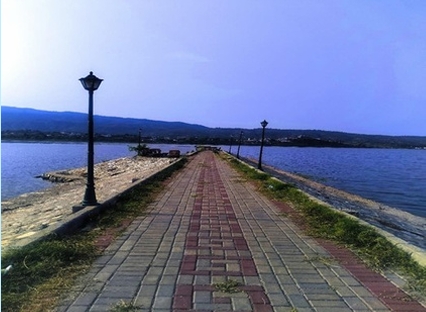
by Janeeta Ahmad Awan
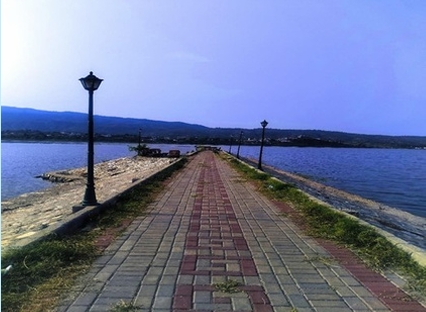
Uchali is a salt-water lake situated in Soon Sakesar Valley, district Khushab in the Southern Salt Range area in Pakistan. Sakesar, which is the highest mountain in the Salt Range at 1525 meters, looms over the lake. It is one of the main tourist attractions of the valley and this natural spot has been discovered recently and has been developed into a visiting site. Soon Valley is my native village, and I conducted this research in my winter holidays during which this area was suffering from the drastic fluctuations of climate change and the whole area faced severe threats of climate change in its crops, lakes, and local community. Soon Valley has three kinds of lakes but Uchali Lake is the largest and the most beautiful among them. In this article, we will explore how climate change has affected this beautiful lake and its local community by being transformed into a polluted and smelly place that has gone totally unmonitored and unregulated.
Uchali Lake in the Past
Being a natural lake located in the heart of the Soon Valley, it had been a popular destination for tourists and locals alike. The lake had a stunning shade of turquoise blue, and its water was crystal clear. The water sparkled in the sunlight and the surrounding hills and forests provided a stunning backdrop. The lake was also home to a variety of wildlife, including ducks, geese, and other waterfowl. Siberian birds and houbara bustard used to come to this lake in winter all the way from Siberian Lake. The lake was also home to several campsites, making it a popular spot for overnight camping trips.
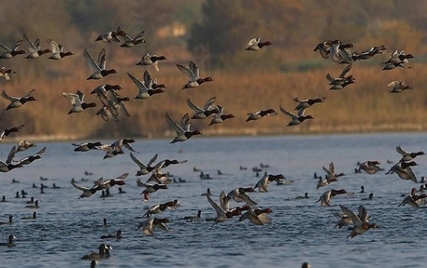
Uchali Lake Under Severe Threat of Climate Change
The tranquility of this saltwater lake is now under siege, as the severe effects of climate change threaten to strip away its natural allure. One of the most conspicuous signs of climate change’s unwelcome embrace is the proliferation of algae. Warmer temperatures provide a conducive environment for the rapid growth of algae, transforming the once crystal-clear waters of Uchali Lake into murky shades of green. This overabundance of algae not only obstructs sunlight from reaching aquatic plants but also depletes oxygen levels, imperiling the diverse ecosystem that once thrived beneath the lake’s surface. Fungi, finding solace in the altered climate conditions, have begun to colonize the lake’s surroundings. The moist and warm environment has become an ideal breeding ground for these microorganisms, further marring the landscape and contributing to the degradation of the lake’s ecosystem.
The proliferation of algae in Uchali Lake is intricately linked to climate change through a combination of temperature increases and altered precipitation patterns. As global temperatures rise due to climate change; several key factors contribute to the exponential growth of algae in aquatic ecosystems which include: Reduced Water Circulation; Warmer Temperatures; Nutrient Availability; Extending growing seasons.
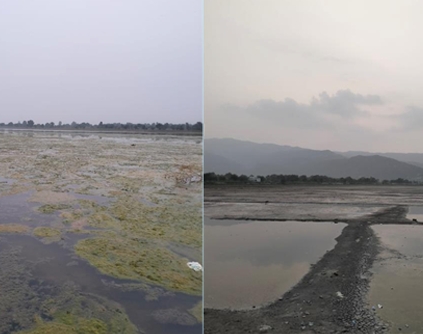
Impact of Climate Change on Uchali Lake and its Aquatic Life
As climate change tightens its grip, the water in Uchali Lake has taken on an unpleasant odor. Elevated temperatures accelerate the decomposition of organic matter, releasing foul smelling gases into the air. The once-refreshing breeze around the lake now carries a pungent scent, deterring visitors and diminishing the overall experience of this natural spot. Adding to the predicament is the visible evidence of the lake’s increasing aridity. Climate-induced shifts in precipitation patterns and rising temperatures have accelerated water evaporation, causing Uchali Lake to recede. The dwindling water levels not only impact the scenic beauty but also disrupt the delicate balance of the lake’s ecosystem, threatening the diverse aquatic life that once flourished within its depths. As we witness the tangible effects of climate change on Uchali Lake, it serves as a poignant reminder of the collective responsibility we bear in safeguarding our natural treasures.
How has the local community been affected by this climate change?
The local community around Uchali lake including some villages such as Chitta, Uchali and Dhadar has been significantly impacted because the transformation of the lake from a popular visiting spot to a place emitting foul odors has brought numerous challenges. It has disrupted the local economy leading to a loss of livelihoods for many residents. Additionally, the foul odors have posed health risks to the community, causing respiratory problems and other related issues. This immediate shift underscores the urgent need for climate action and adaptation strategies to mitigate the adverse effects on the local population.
In an exclusive interview with the caretaker of Uchali Lake, Mr. Mahmood, who tirelessly watches over the lake day and night, a somber tale of climatic crisis and its severe repercussions on tourism unfolds. He has observed the unfolding environmental challenges faced by the local community and the tourists.
Expressing deep concern, he emphasized the tangible impact of climate change on Uchali Lake’s fragile ecosystem. The proliferation of algae, the invasion of fungi, and the unsettling odor emanating from the water have not escaped the watchful gaze of this guardian of nature. He highlighted the urgency for concerted efforts to address climate change impacts, implement sustainable practices, and safeguard the lake’s natural charm because he is also suffering from the crisis living there.
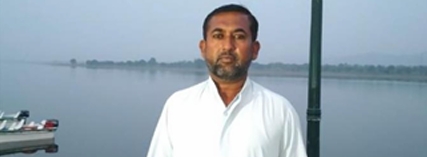
Mr. Mahmood. Caretaker of Uchali Lake
Impact of Climatic Change of Uchali Lake on Tourism
Due to hazardous climatic effects on Uchali lake, there has been a severe impact on local people and tourism, such as; Economic impact on local businesses (local food stalls, cycling, boating practices); Negative impact on tourism; Water scarcity and threat to livelihoods; Health concerns (respiratory problems); Displacement and migration of the local population.
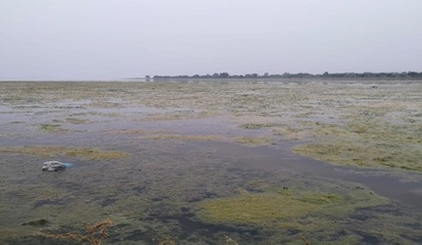
Sustainable solutions to the growing destruction in the lake due to climate change
Addressing the challenges posed by climate change in Uchali Lake requires a comprehensive approach that involves both local and global efforts. Here are some recommended solutions:
Ecosystem Restoration
Implement measures to restore and maintain the ecological balance of Uchali Lake, including the removal of excess algae and restoration of native vegetation.
Adaptive Management Strategies
Develop and implement adaptive management strategies to address the changing climate conditions and their impact on the lake.
Sustainable Tourism Practices
Encouraging eco-friendly accommodations, responsible tourism behavior, and low-impact recreational activities.
Legislation and Policy Development
Policies should be developed that incentivize sustainable practices and penalize activities contributing to environmental degradation.
Government and Institutional Involvement
The role of government agencies and developmental organizations management, tourism in promotion, environmental protection should lake and be strengthened.
Citizen Journalism
It can play a crucial role in raising awareness about the environmental challenges faced by the lake and surrounding community. It can amplify the community’s voice and advocate for sustainable solutions.
Storytelling and Data-driven Reporting
It can mobilize support for initiatives aimed at restoring Uchali lake and improving the livelihoods of the local community affected by it.
In conclusion, the plight of Uchali Lake serves as an example of the far-reaching consequences of climate change on our natural treasures. Addressing the environmental challenges requires a multi-faceted approach, ranging from global initiatives to curb greenhouse gas emissions to local, community-driven efforts for sustainable lake management. By implementing recommended solutions, fostering community engagement, and securing institutional commitment, we can aspire to restore Uchali Lake to its former glory. The lessons learned from Uchali Lake resonate globally, emphasizing the interconnectedness of climate, ecosystems, and human well-being, urging us to act as custodians of our precious natural heritage.
______________________
The author is a student of media and development communication at University of the Punjab, Lahore.

